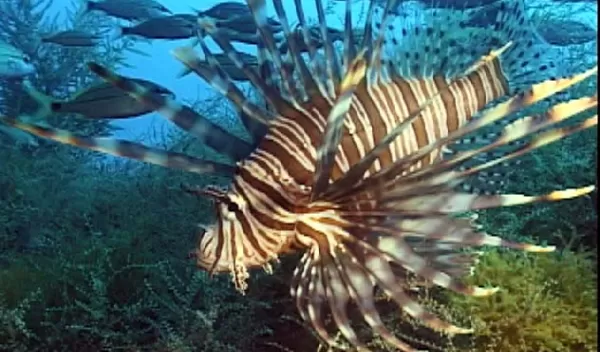
Atlantic Coral Reefs Are No Match for This Lion
Native to the warm waters of the Pacific and Indian Oceans, the red lionfish is a beautiful creature to behold. With its intricate stripes and stunning spines, it's easy to see why this gracious predator was scooped up by aquarium enthusiasts and brought to Florida.
Unfortunately, some of these Pterois volitans specimens apparently escaped their glassy confines and made it into the Atlantic Ocean, where, according to new research, this lion of the shallow seas is now on a deadly rampage. If left unchecked, the researchers contend, the lionfish could spell disaster for the coral reef ecosystems that are vital to health of the Atlantic and the rest of our planet.
According to Mark Hixon, professor of zoology at Oregon State University, the red lionfish is a voracious and skilled predator. Growing over a foot in length, it can appear to be a drifting clump of seaweed and herd smaller fish into confined space before consuming its prey with a rapid strike. Hixon says the fish species that inhabit Atlantic coastal reefs have never seen such an energetic and effective hunter in their midst.
To study the impact of the lionfish on coral reefs, Hixon and his graduate student Mark Albins traveled to a coral reef research station at Lee Stocking Island in the Bahamas. Near the station are many small coral reefs, allowing the researchers to safely introduce the lionfish to some reefs while keeping other reefs free from the intruder.
The researchers surveyed the different fish species and their numbers in all the reefs before and after they released the lionfish. The results were shocking--the hungry hunters decimated almost 80 percent of the young fish in the reefs they inhabited. Yet perhaps most disturbing is that most of the other fish eaten by lionfish were in a sensitive stage in their development as juveniles before maturing into functioning adults.
Hixon and Albins fear that this level of destruction could become the norm for many Atlantic reef systems.
Coral reefs are crucial to the health of oceans in many ways. In addition to forming natural breakwaters and helping to prevent shore erosion, the reefs provide a sanctuary for thousands of species of marine plants and fish, including many species sought after by commercial fishermen. Reefs are complex ecosystems, so the introduction of such a dangerous invasive species like the red lionfish can drastically upset the balance that keeps these rainforests of the ocean healthy. Reefs are also an important source of new medicines and other compounds useful to humans.
In their research, Hixon and Albins recommend that steps be taken now to address the lionfish threat before they expand further. One option is to maintain protected marine reserve areas in the ocean. Such fully protected areas in the sea can support many large predatory fish native to the Atlantic that may provide a natural control of lionfish.
Although neither researcher believes that the lionfish can be completely eradicated from the Atlantic, Hixon said in an interview last week that there are steps ocean communities and countries can take to reduce their numbers and their impact, such as sending divers into reefs to collect and exterminate as many of the invaders as possible. In the Bahamas, for example, local officials have begun a campaign encouraging locals to harvest the pests for food.
Luckily for the health of the Atlantic and its reef systems, according to Hixon the foreign predator "tastes just like chicken."


